Choosing your CPAP mask is a huge step: It’s probably the most important one on your journey to better sleep. Get it right, and you’re set for successful therapy. But with so many options, it’s easy to feel overwhelmed. Don’t worry, we’ve got your back. This guide is here to cut through the confusion and help you find the perfect mask for you.
Ready to become a CPAP mask expert? Here’s what you’ll learn in this blog:
The Big Three: We’ll break down the key differences between nasal pillow, nasal, and full face CPAP masks.
Sleep Your Way: Discover the best mask for your sleeping style, whether you’re a side, stomach, or back sleeper.
Pros & Cons: Get an honest look at each mask’s fit, comfort, and how it handles your pressure settings.
Mouth vs. Nose: Find out what to consider if you breathe through your mouth or your nose.
Troubleshooting 101: Learn how your mask choice can help solve common issues like leaks and skin irritation.
Top Picks: We’ll share some popular and effective mask examples you can find right here on Sleeplay to match your needs.
Let’s dive in!
Nasal Pillow Masks
If you want the most minimalist experience possible, the nasal pillow mask is your new best friend. They are the smallest and lightest CPAP masks category. They don’t cover your nose or mouth; instead, they use soft silicone “pillows” that rest at the entrance of your nostrils to deliver airflow. It’s the perfect design for anyone who feels a bit claustrophobic with larger masks or simply wants less fuss.
For a closer look at all the lightweight and comfortable options, check out Sleeplay’s nasal pillow masks collection.
1. Who Are Nasal Pillow Masks Best For?
This mask style is a game-changer for a lot of people. You will most likely prefer a nasal pillow mask if you:
Breathe only through your nose when you sleep.
Feel anxious or closed-in by larger full-face or nasal masks.
Have facial hair, as there’s no cushion sealing over your upper lip.
Like to read, watch TV, or wear glasses before drifting off.
Are a light sleeper who is sensitive to noise or weight on your face.
Travel often and need a mask that’s compact and easy to pack.
It’s important to note that Nasal pillow masks aren’t ideal for mouth breathers. As the Mayo Clinic study suggests, breathing through your mouth can lead to dryness and render the therapy less effective. [1] If you’re a mouth breather but love this style, pairing it with a chin strap can help. You can learn more about this in our guide on How to Breathe With CPAP Nasal Pillows.
2. Key Benefits
Minimal Facial Contact: Say goodbye to red marks and skin irritation. This is a huge plus if you have sensitive skin or a beard.
Lightweight and Compact: You’ll barely notice it’s there, and it’s a breeze to pack for travel.
Quiet Operation: Many new models have advanced venting systems that diffuse air gently, making for a quiet experience for you and your partner.
Clear Field of Vision: With nothing covering your eyes, you can easily read a book or catch up on your favorite TV show before bed.
Easier Adherence: Studies have shown that nasal masks are often linked with better adherence and lower leak rates compared to masks that cover both the nose and mouth (oronasal masks). [2]
3. Possible Limitations
Even the best masks have their limitations. Here are some potential downsides of Nasal pillow masks:
Not for High CPAP Pressures: The direct airflow can feel intense for users who need high CPAP pressure settings.
Can Dislodge: If you’re an active sleeper who tosses and turns, the pillows might shift out of place.
Nasal Dryness: Some users experience nasal dryness or soreness. Making sure you have the right fit is crucial to avoid this. For more insights on this, read about Common CPAP Mask Mistakes That Are Affecting Your CPAP Therapy.
Improper Fit Causes Leaks: As experts at Homesleep point out, a poor seal can cause air to escape from your nostrils, so finding the right pillow size is key. [3]
4. Product Examples
Here are a couple of the most popular nasal pillow masks that our customers love:
ResMed AirFit P10 Nasal Pillow CPAP Mask: This mask is famous for being incredibly lightweight and whisper-quiet, thanks to its QuietAir™ woven-mesh vents. It’s simple, slip-on headgear and minimal design make it a favorite for those seeking comfort and simplicity.
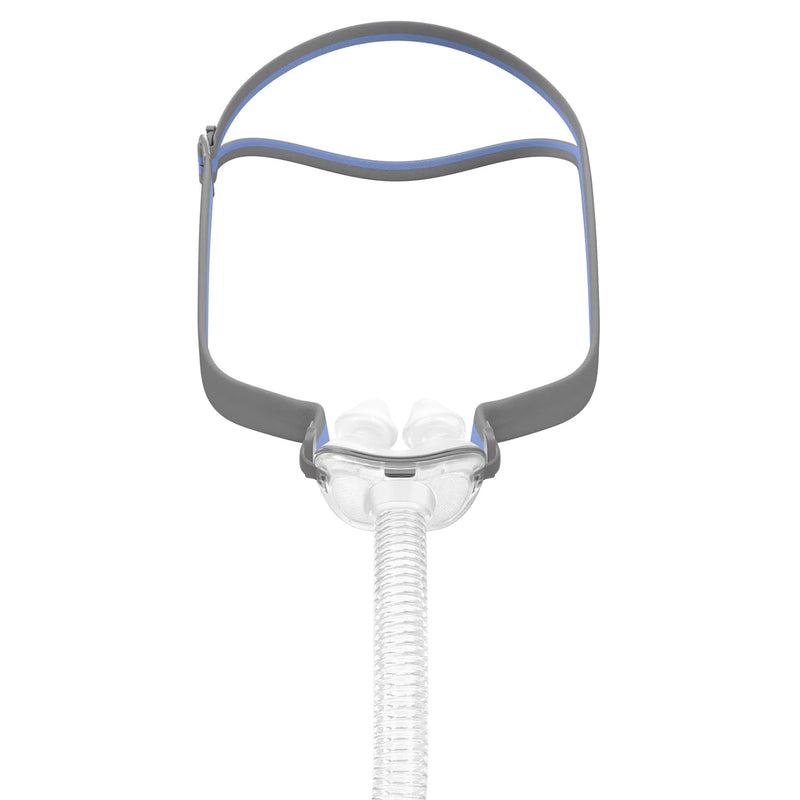
The AirFit P10 Nasal Pillow mask offers lightweight support, premium comfort, and a quiet experience beyond the ordinary.
$80.00
ResMed AirFit P30i Nasal Pillow CPAP Mask Starter Pack: Freedom is the name of the game with the P30i. It features a top-of-the-head hose connection that swivels 360 degrees, allowing you to sleep in any position without getting tangled. It’s a fantastic choice for active sleepers and those who want a low-profile setup.
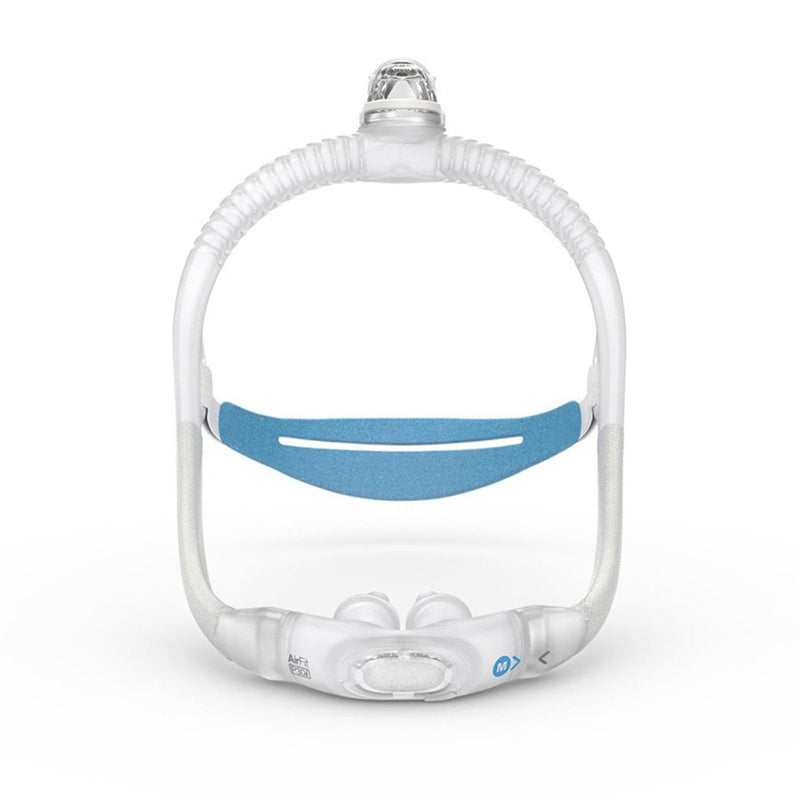
The ResMed AirFit P30i Standard Starter Pack is designed to keep tubing out of your way, which gives you the freedom to sleep in any position and get close to your bed partner.
$115.00
If these two don’t seem like the right fit, don’t worry! Explore our full nasal pillow mask collection to find other excellent minimalist options.
Remember, keeping your mask in top shape is essential for good therapy. Learn the best practices in our guide on How To Clean A CPAP Mask.
Nasal Masks
Think of the nasal mask as the reliable middle-ground option. Nasal CPAP masks are designed to cover just the nose and sit on the bridge and around the nostrils. They deliver airflow through the nasal passage only. These are typically more structured than nasal pillows, offering a stable seal with more cushion without covering the mouth or the full face.
This mask style is often recommended for people who:
Primarily, breathe through their nose.
Need medium-to-high CPAP pressure settings.
Want a balance between a secure seal and an open field of vision.
Find nasal pillows leaky or uncomfortable, but don’t need a full face mask.
Nasal masks are a popular choice for a reason, and you can see a wide variety in the Nasal Mask collection at Sleeplay.
Key Benefits
Secure and Stable: More structured than nasal pillows, they provide a dependable seal throughout the night.
Less Bulky: They offer more freedom and a clearer line of sight than their full-face counterparts.
Lower Leak Risk: The cushion design often leads to fewer unintentional air leaks compared to nasal pillows.
Great for Active Sleepers: The secure fit tends to stay in place better, even if you shift positions.
A Solid Starting Point: Their balance of comfort and performance makes them a great middle-ground option for beginners.
A study by the American Thoracic Society backs this up. The study found that nasal masks are associated with higher therapy adherence and lower leak rates when compared to masks that cover both the nose and mouth.
Limitations and Considerations
While they are a go-to for many, there are a few things to keep in mind:
Not Suitable for Mouth Breathers: Just like nasal pillows, these are designed for nose breathing. Using a chin strap can help, but it’s not a foolproof solution.
Nasal Bridge Pressure: An improper fit can cause pressure or red marks on the bridge of your nose. Avoiding these Common CPAP Mask Mistakes That Are Affecting Your CPAP Therapy is key to comfort.
Potential for Oral Leaks: As noted in guides from resources like Homesleep, some users may still experience “oral leak,” where air escapes through the mouth, especially at higher pressures. While solutions like chin straps or medical tape exist, they’re not always reliable.
Featured Products
Finding a mask that delivers a great seal without sacrificing comfort is crucial. Here are two of the Best CPAP Nasal Masks in 2025 that our customers frequently praise:
ResMed AirFit N30i Nasal CPAP Mask: This model combines a soft ComfiSoft™ cushion with a top-of-head tube design that stays out of the way—ideal for side and stomach sleepers. Its low-noise venting and fabric touchpoint enhance comfort and usability, especially for couples sharing a bed.

The ResMed AirFit™ N30i feels more natural, with a top-of-the-head tube design that allows patients to sleep in any position and closer to their bed partner.
$84.00
ResMed AirTouch N20 Nasal CPAP Mask: Known for its exceptional comfort, the N20 uses an UltraSoft™ memory foam cushion that adapts to your face. It’s an excellent choice for users with sensitive skin or those who have struggled with pressure sores from other masks. Many users, including those with smaller facial structures, find this mask to be a great fit, a topic we explore more in our guide to the Best CPAP Masks for Women in 2025.
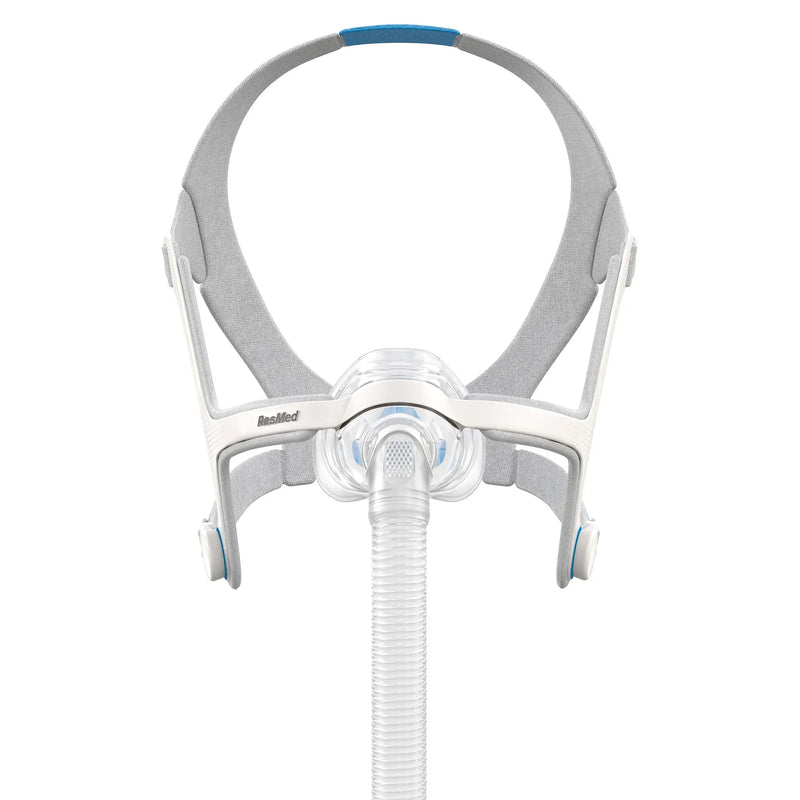
The AirFit N20 Complete Mask System offers the ultimate comfort experience, featuring an adaptive cushion for all faces while having a better sleep.
$74.00
If you’re looking for that perfect balance of strong performance and a comfortable fit, explore more options in our full Nasal Mask Collection.
Full Face Masks
If you breathe through your mouth at night, a full-face CPAP mask is your most reliable solution. These masks are designed to seal around both your mouth and nose, delivering pressurized air through both channels. They are essential for anyone with chronic nasal congestion or allergies, or for those who have difficulty adapting to a nasal-only mask.
Full-face masks are the most common type used by people with moderate to severe sleep apnea. Research from a key ATS Workshop Report highlights that while these masks sometimes require higher pressure settings and can have a greater risk of leaks, they are a necessary and effective tool when nasal-only solutions fail.
And don’t worry about them feeling bulky; modern designs have improved dramatically, offering lighter materials, better seals, and far more comfort than older models.
You can explore a wide range of these improved designs in Sleeplay’s Full Face Mask Collection.
1. Advantages and Limitations
Here’s a balanced look at what full-face masks offer:
Benefits:
Allows mouth breathing—ideal for chronic nasal congestion or allergies
Delivers consistent pressure regardless of sleep position or breathing route
Better control of oral leaks
Useful for high-pressure CPAP users
Often preferred for people with sleep apnea and sinus complications
Limitations:
Larger Footprint: The larger surface area can feel overwhelming or cause claustrophobia for some users.
Potential for Skin Irritation: A proper fit is crucial. Without it, the larger cushion can cause irritation or red marks.
Higher Leak Potential: The larger seal area means more opportunity for leaks if the mask isn’t sized and adjusted correctly. Avoiding these Common CPAP Mask Mistakes That Are Affecting Your CPAP Therapy is vital.
Slightly Louder: The increased airflow and surface area can sometimes generate a bit more noise than smaller masks.
Adjustment Period: New users may need more time to get used to the feel of a full-face mask.
2. New CPAP Masks
Wondering where to start? Many of the Best Full Face CPAP Masks of 2025 focus on comfort without compromising on the seal. Here are two top-rated options:
ResMed AirFit X30i Oral-Nasal (Full Face) CPAP Mask: A hybrid design that combines nasal pillow comfort with full face coverage. Ideal for mouth breathers who want a lightweight solution without blocking their field of vision. The top-of-head hose connection keeps the tubing out of the way for free movement, especially helpful for side and stomach sleepers.
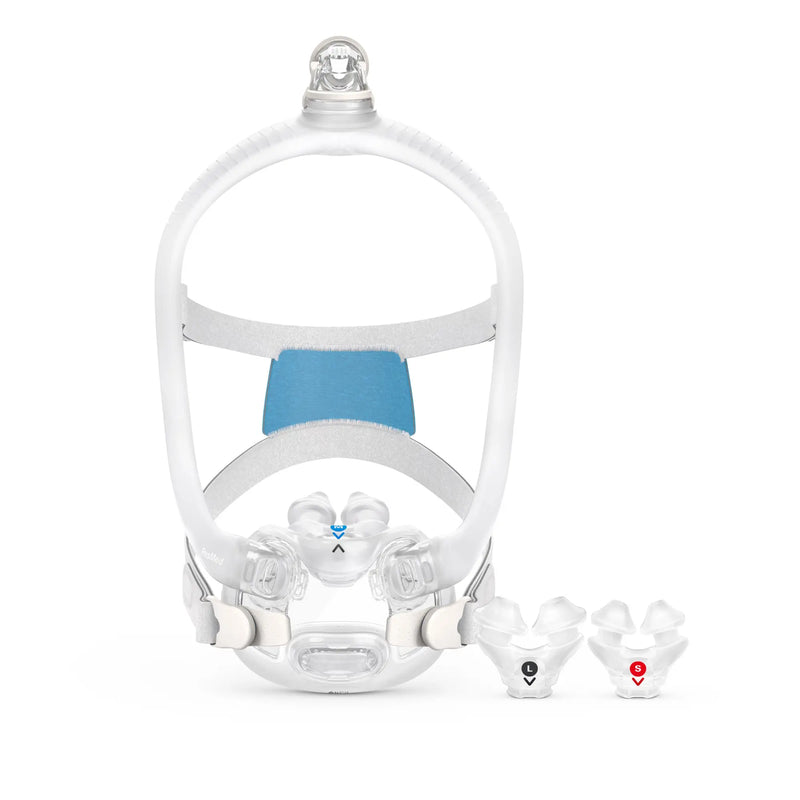
The AirFit X30i is a full face mask that uses a nasal pillows system that seals around the mouth and gently under the nostrils, without covering the bridge of your nose or sitting heavily on your face.
$250.00
ResMed AirTouch F20 Full Face CPAP Mask: Designed with UltraSoft™ memory foam for a more breathable and less irritating seal. Great for users who have had issues with red marks or discomfort using traditional silicone cushions. Works well at high-pressure settings and offers reliable sealing for mouth breathers.
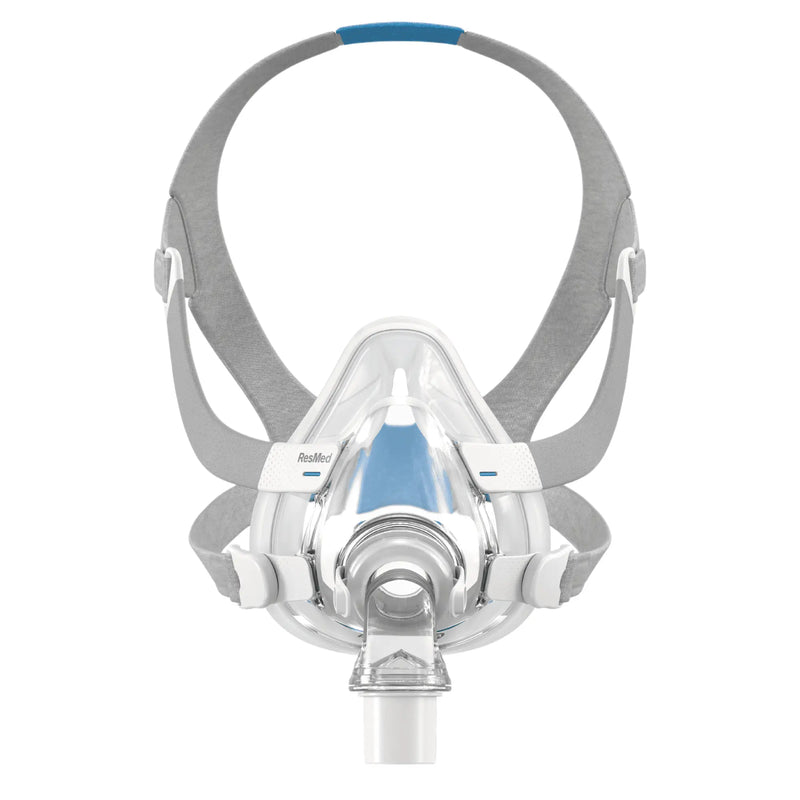
One of our most popular and best-selling masks praised for fit, comfort, and effectiveness—the perfect choice for mouth breathers, allergy, and stuffy nose sufferers.
$124.00
These are just a couple of examples. Be sure to explore the complete Full Face Mask Collection to find the perfect match for your needs.
How to Know Which CPAP Mask Is Best for You
Finding the perfect CPAP mask isn’t a one-size-fits-all situation. The best choice for you depends on personal factors like how you breathe at night, your prescribed pressure setting, your go-to sleeping position, and even your facial shape.
As the American Thoracic Society Workshop Report highlights, finding the right fit and style is one of the key factors in adhering to your therapy and achieving excellent results.
It’s completely normal to try more than one mask before you find “the one.” That’s why we offer guidance and Fit Packs to make that journey of discovery a little easier.
Match Your Sleep Style to the Right Mask
To make things simple, we’ve put together this quick-reference table. Find your situation below to see which mask type might be your best starting point.
Additional Factors to Consider
Beyond the basics, a few other details can make all the difference:
Your Sleep Position: Are you a side sleeper? A mask with a top-of-head hose connection, like the ResMed AirFit N30i or AirFit P30i, keeps the tubing out of your way and allows for more freedom of movement.
Claustrophobia or Anxiety: If larger masks make you feel anxious, the minimal facial coverage of a nasal pillow mask like the ResMed AirFit P10 can provide a much more comfortable experience. You can find more of these in our Nasal Pillow Masks Collection.
Skin Sensitivity: Waking up with red marks is no fun. Masks with memory foam cushions, like the ResMed AirTouch N20 and AirTouch F20, offer a gentler seal. Fit is especially important for different facial structures, a topic we cover in our guide to the Best CPAP Masks for Women in 2025.
Your Prescribed Pressure: If your doctor prescribed a high pressure setting, you’ll likely need a sturdier mask from the Nasal Masks Collection or one of the Best Full Face CPAP Masks of 2025 to prevent leaks.
How You Actually Breathe: You might think you’re a nose breather, but your body could have other plans while you sleep. If you have chronic nasal congestion or wake up with a dry mouth, you’ll need a solution from our Full Face Masks Collection.
You’re Not in This Alone
Finally, remember that finding the right mask is a process. Research shows that involving a bed partner or caregiver in your setup can help improve your success early on. Don’t be afraid to ask for help, try different styles, and use fitting guides. The “best” mask is the one you’ll actually wear, and discovering it is a worthwhile investment in your health.
Final Thoughts
Choosing a CPAP mask is one of the most personal decisions you’ll make in your sleep therapy journey. As we’ve covered, the best mask isn’t about having the newest or most popular model; it’s about finding the one that fits your unique lifestyle and therapy needs.
Remember to be patient with yourself during this process. It might take a little trial and error, but finding that perfect fit is the key to unlocking comfortable, consistent, and successful therapy. You’ve already taken the first step by learning the differences, and now you’re equipped to make a choice that truly works for you.
To quickly recap, here’s a simple breakdown of which mask to consider based on your primary need:
Best For… | Recommended Mask Type |
Minimal contact | Nasal Pillow Mask |
Balanced fit and comfort | Nasal Mask |
Mouth breathers | Full Face Mask |
Facial hair or glasses wearers | Nasal Pillow or Hybrid Mask |
High-pressure prescriptions | Nasal or Full Face Mask |
You’ve got this. The right mask is out there, and it will make all the difference in your journey to healthier sleep and better days ahead.
FAQs
What are the main types of CPAP masks?
The three main types are nasal pillow masks, which are the smallest and use soft pillows that seal at the nostrils; nasal masks, which cover the entire nose to deliver air; and full face masks, which create a seal around both the nose and mouth. Each is designed for different breathing styles, pressure needs, and comfort preferences.
Which CPAP mask is most comfortable?
Comfort is highly personal, and what works for one person might not work for another. Many users find nasal pillows to be the most comfortable due to their minimal facial contact. However, others prefer the secure feeling of a nasal mask or the plush memory foam cushions found on modern full-face masks like the AirTouch F20. The most comfortable mask is the one that fits you best and meets your therapy needs.
What’s the difference between nasal and full-face CPAP masks?
The key difference is what they cover. A nasal mask delivers pressurized air only through your nose, making it ideal for people who naturally breathe through their nose. A full face mask covers both the nose and mouth, which is essential for mouth breathers or anyone with frequent nasal congestion.
Can I use nasal pillows if I breathe through my mouth?
It’s generally not recommended. If you use a nasal pillow and open your mouth, the pressurized air will escape, making your therapy ineffective and causing dry mouth. While some people find success by adding a chin strap to keep their mouth closed, a full face mask is often a more direct and reliable solution for mouth breathers.
Are full face masks better for high pressure?
Both full-face masks and well-structured nasal masks are excellent for high-pressure settings. Their designs provide a strong, stable seal that can handle a more forceful airflow without leaking. The best choice between the two will still depend on whether you breathe through your nose or mouth.
How do I choose the right CPAP mask?
To choose the right mask, consider your primary breathing style (nose or mouth), your typical sleeping position (back, side, or stomach), your prescribed pressure level, and personal comfort factors like facial hair or claustrophobia. Use the comparison table in this guide as a starting point and don’t hesitate to talk to your healthcare provider for a recommendation.
Why is my CPAP mask leaking air?
Mask leaks are usually caused by one of four things: an improper fit (wrong size or style for your face), a worn-out cushion that needs replacing, incorrect headgear adjustment (either too loose or too tight), or significant movement during sleep that dislodges the seal.
How can I prevent dry mouth or nose while using CPAP?
The best way to prevent dryness is by using a heated humidifier with your CPAP machine. This adds moisture to the air you breathe, making it much more comfortable. Ensuring your mask has a good seal and using a chin strap with a nasal mask to prevent mouth breathing can also make a big difference.
Can I travel with my CPAP mask and machine?
Absolutely. Modern CPAP machines are portable, lightweight, and FAA-approved for use on airplanes. It’s always best to pack your machine and mask in your carry-on luggage to prevent damage or loss. For even easier packing, consider a compact travel CPAP machine.
References
Mayo Clinic Staff. “CPAP Masks: Tips for Avoiding 10 Common Problems.” Mayo Clinic, 31 Jan. 2024.
Genta PR, Kaminska M, Edwards BA, et al. “The Importance of Mask Selection on Continuous Positive Airway Pressure Outcomes for Obstructive Sleep Apnea.” An Official American Thoracic Society Workshop Report. Ann Am Thorac Soc. 2020 Oct;17(10):1177-1185. doi: 10.1513/AnnalsATS.202007-864ST. PMID: 33000960; PMCID: PMC7640631.
“Different Types of CPAP Masks.” Home Sleep, Accessed 14 June 2025.







